You are using an out of date browser. It may not display this or other websites correctly.
You should upgrade or use an alternative browser.
You should upgrade or use an alternative browser.
Delaunay's dream: A World Football Timeline
- Thread starter ArupinumMaivista
- Start date
Interesting choice with Yugoslavia!My picks: Peru, Brazil, Italy, and Yugoslavia...
So marks the end of Scotland's golden generation of the 1960s. An early version of the 1978 debacle with Peru from OTL then? Never thought of that but will be interesting to see how the Scotland team will go into the 1970s...as along as Ally MacLeod doesn't get the Scotland job ITTL we'll be saved from embarrassment and that song that set us up to fail.
Anything is better than whatever the hell we are getting in Croatia...as along as Ally MacLeod doesn't get the Scotland job ITTL we'll be saved from embarrassment and that song that set us up to fail
Coulsdon Eagle
Monthly Donor
The OTL Brazil win over England remains one of the finest matches I have had the pleasure of recalling.
Many argue that England's 1970 team was better than the one of 1966. Though I honestly don't want to argue about it, largely because I simply never got to see those teams playing aside from the footage on YouTube. Both were great at the end of the day, and I think moving that match to the quarters gives it even more significance.
Coulsdon Eagle
Monthly Donor
On paper they were. At left back Cooper was as highly rated as Wilson was; Newton was an upgrade on Cohen on the right; Labone a different animal to Jack Charlton; Mullery had more to his game than Stiles (scored an excellent goal against West Germany); Lee was comparable to Roger Hunt; meanwhile the true English greats Moore & Banks had only improved, as had lesser mortals Hurst & Peters. Only player who had marginally declined in the intervening 4 years was Bobby Charlton.Many argue that England's 1970 team was better than the one of 1966. Though I honestly don't want to argue about it, largely because I simply never got to see those teams playing aside from the footage on YouTube. Both were great at the end of the day, and I think moving that match to the quarters gives it even more significance.
Unfortunately they ran into the greatest footballing outfield X ever fielded, topped by the man I always think of as the GOAT, Pele. (X not XI as no way Felix should have been allowed anywhere near an international team). I wasn't lucky enough to see two teams that might rival Brzil - Real Madrid and the Magyars in the 1950's - but felt blessed to watch 1970 - and on colour telly!
It's criminal that some folk nowadays downplay Pele's achievements. The whole "Goat" debate has just lost its meaning to me to be honest, especially with this current generation.
1970 World Cup: Knockout stage
1970 World Cup
"Samba in Azteca"
Quarter-finals
Peru's subsequent shock win against Scotland made it so the South Americans would join Brazil for the knockout stage, but they would now have to play against one of the best defenses in the World Cup - the Soviet Union. Despite lacking Lev Yashin, the Reds have more than an effective attack with Anatoliy Byshovets, but the game in itself resembled chess, as the two sides played carefully in order to not concede. 90 minutes passed, and the game went into extra time, as the Peruvians continued their onslaught, Hugo Sotil headed the ball past Anzor Kavazashvili to make it 1-0 for Peru in the 117th minute, despite the Soviets claiming that the ball had crossed the touchline during the Peruvian attack. Nevertheless, the game was settled, and Peru was off to the semi-finals."Samba in Azteca"
Quarter-finals
Italy on the other hand had a much easier time against their hosts. Despite Jose Gonzalez taking the lead for Mexico, his teammate Javier Guzman brought Italy back into the game via a blunder by the defender. From then on, Italy dominated the match, as Gigi Riva and Gianni Rivera netted the ball three times to make it a firm 4-1 victory for the Azzurri
Riva's second goal in the 76th minute

The following match in Guadalajara was certainly the most anticipated of the tournament - England vs Brazil. The two nations have faced off three times in the past 12 years, and Brazil was always the one that came out on top. A Canarinha, comprised of Carlos Alberto, Pele, Jairzinho, Tostao, Rivellino and co. were now going to play their biggest test in the tournament against the reigning World Champions. The subsequent match saw pure football, as Brazilian flair clashed with the English workman-like football, as both sides exchanged chances from beginning to end. Pele had his moment as he shot the ball towards the goal. but Gordon Banks made a monstrous save to help England stay alive. Peters, Lee and Hurst all had their opportunities, but in the end, Jairzinho was the one to outrun the English defense and shoot the ball into the net past Banks, helping Brazil achieve its 1-0 victory against England. Surely now, Brazil were on course to win the World Cup.
Germany's match against Yugoslavia was nowhere near the quality of the match in Guadalajara, but it was a decisive one for both sides. Germany, having endured several defeats from Yugoslavia during the recent years, finally had a chance and team to beat the Blues, while Yugoslavia could always rely on Dragan Džajić. Indeed, it was Džajić who scored for Yugoslavia in the 87th minute, but by then it was too late. Uwe Seeler and Gerd Muller both scored early for Germany, and the defense led by Franz Beckenbauer practically hushed every attack made by the south Slavs. It was a deserved victory by Germany, while the reigning European Champions could now switch their focus on the upcoming '72 Euros.
Gordon Banks' save against Pele
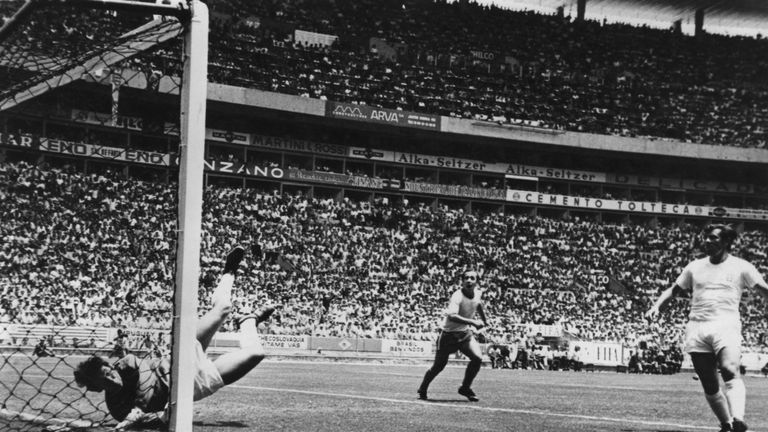
Semi-finals
In what was going to be the 7th encounter between two South American teams in a World Cup, the 50 thousand spectators that were present for the Peru-Brazil match were in for another classic, as the Peruvian underdogs had a chance to cause an upset of epic proportions and qualify for the final in their first world cup in 40 years. Already by the 15th minute though, Brazil led with goals by Tostao and Rivellino, with Felix Galardo slimmed down the Brazilian lead to 2-1 some 13 minutes later. Amazingly, both sides made up 49 chances in total as the game progressed, while Tostao managed to widen the gap between his team and Peru by making it 3-1. However, Teofilo Cubillas thought differently, and he gave his nation a chance o believe in the 70th minute, by making it 3-2. With 20 minutes to go, Peru still had a chance to level the result and send the game into extra time. Then Jairzinho appeared. Having scored in every match he participated in this competition, he lived up to his status and scored five minutes after Cubillas' screamer. It was 4-2 for Brazil, and that's how it ended. Fittingly, the match was the high-scoring regular-time match of the tournament, but Brazil was the one on top.
Semi-finals
Brazilians celebrating
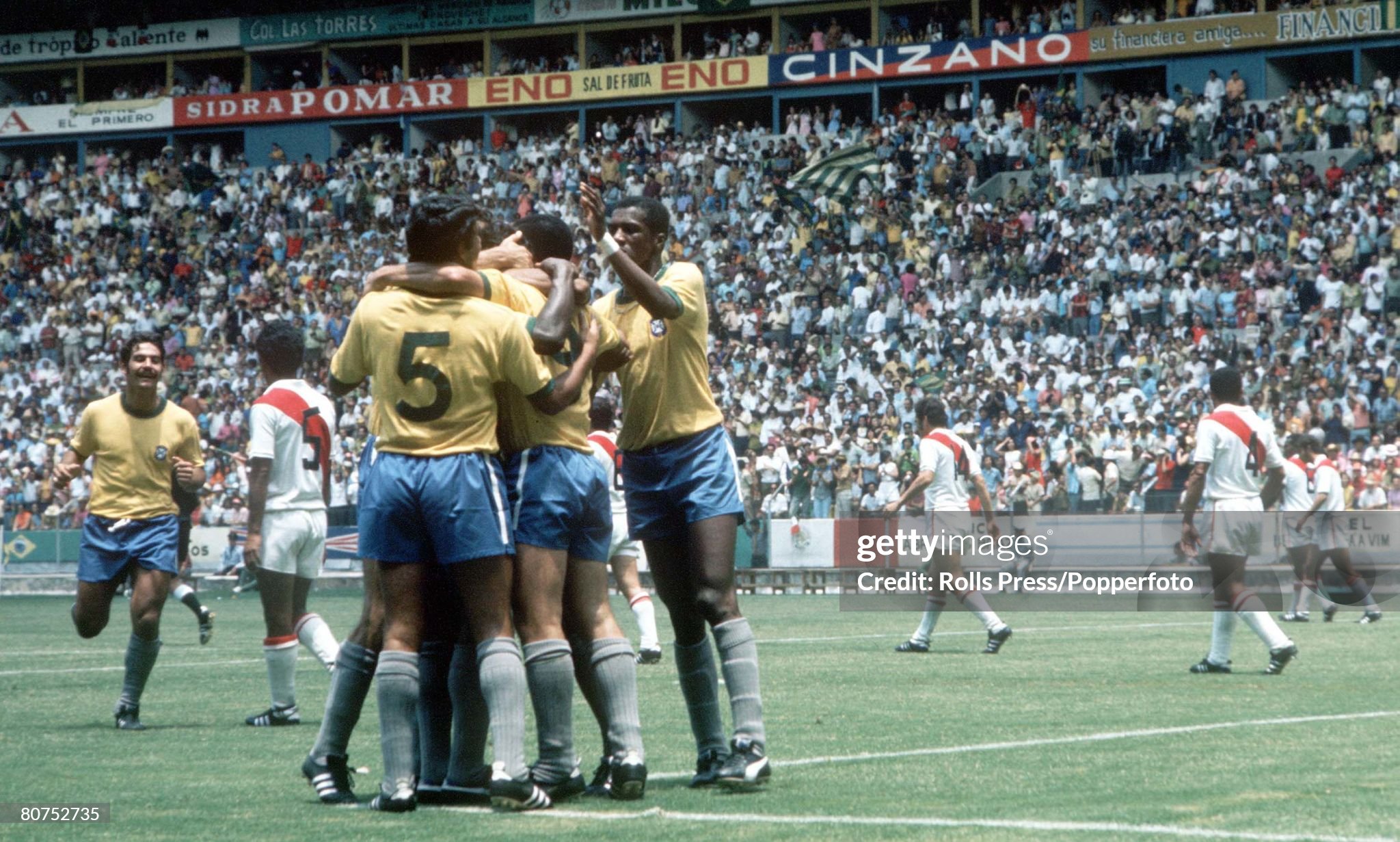
At Azteca, the replay of the 1968 Euros group stage would occur as European runners-up, Italy, would meet with Germany. The tournament's best defense was now gonna have to try and stop the unstoppable Axis of Helmuth Schoen's Mannschaft. Already at the 8th minute, Italy took the lead with Roberto Boninsegna, and for a good while, the Azzurri led the match. It got even worse for Germany when, in the 70th minute, Franz Beckenbauer had dislocated his shoulder. Yet, Beckenbauer stayed and led his team, all while carrying the injury. As the 90th minute ended, the Italians waited for referee to whistle the end of the match, only for Wolfram Lowe to score in the dying minutes of the match! Just like that, Germany was back in the game, and the extra time would prove to go down in history as the "Game of the century". 
At the beginning of extra time, Gerd Muller shot one past Ricky Albertosi to move Germany above Italy, only for Istrian native Tarcisio Burgnich to equalise four minutes later. 2-2, and it wasn't even the 100th minute! Italy didn't stop, and Gigi Riva stepped up to deliver a beautiful goal that would send Italy ahead of Germany once again! Yet again though, Muller would come into rescue and headed the ball to make it 3-3! As the celebrations subsided, Roberto Boninsegna crossed the ball in another attempt by Italy, and there was Gianni Rivera, pushing the ball into the net, and it was all over! Italy had won in one of the most spectacular matches to ever be seen, and in colour!
Franz Beckenbauer, carrying his injury in extra time
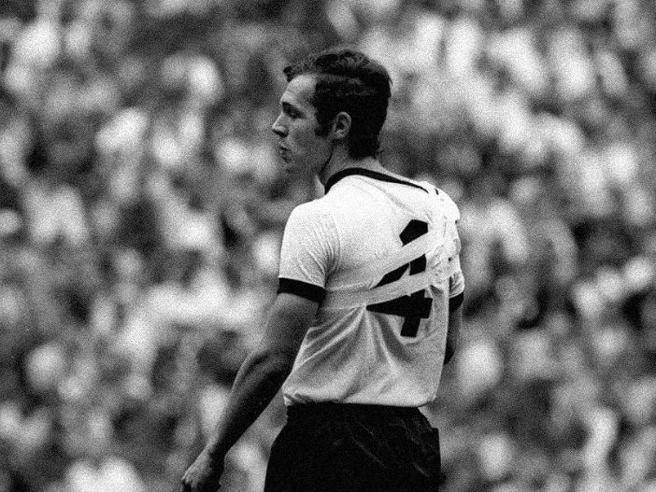
Third place play-off
Having already met in the group stage, Germany was expected to have a far more difficult time against Peru now that Beckenbauer could rest, while the Peruvians were on the hunt for their first piece of silverware. Yet, Wolfgang Overath made the most of his appearance to score in the 26th minute, and Peter Ducke added to the scoring to make it a comfortable 2-0 win for Germany, which had now scored two consecutive third places in the World Cup. The first team to do so. 
Third place play-off
Germans celebrating following Overath's goal
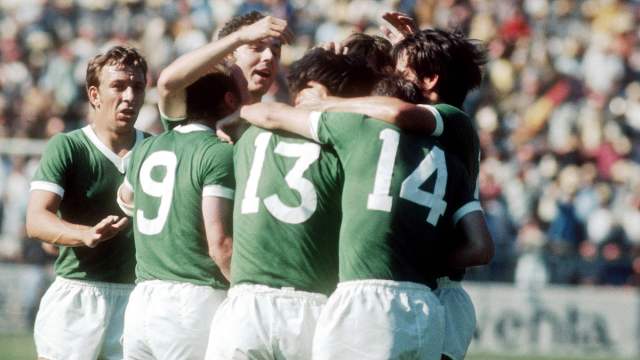
World Cup Final
And with that, Brazil are once again champions of the world, in a World Cup filled to the brim with memorable matches, from start to finish. Every team that was in the knockout stage was no pushover, not even Mexico, who have once again made themselves into unsung heroes, after their inspired 1962 campaign, but Brazil was now without a doubt the greatest team on earth. With that, we leave the World Cup and venture back to Europe, as the 1972 European Championship soon begins in Belgium!
Upcoming groups:
GRP 1: Belgium, Germany, Italy, Romania
GRP 2: England, Hungary, Soviet Union, Yugoslavia
Pele, metaphorically on top of the world
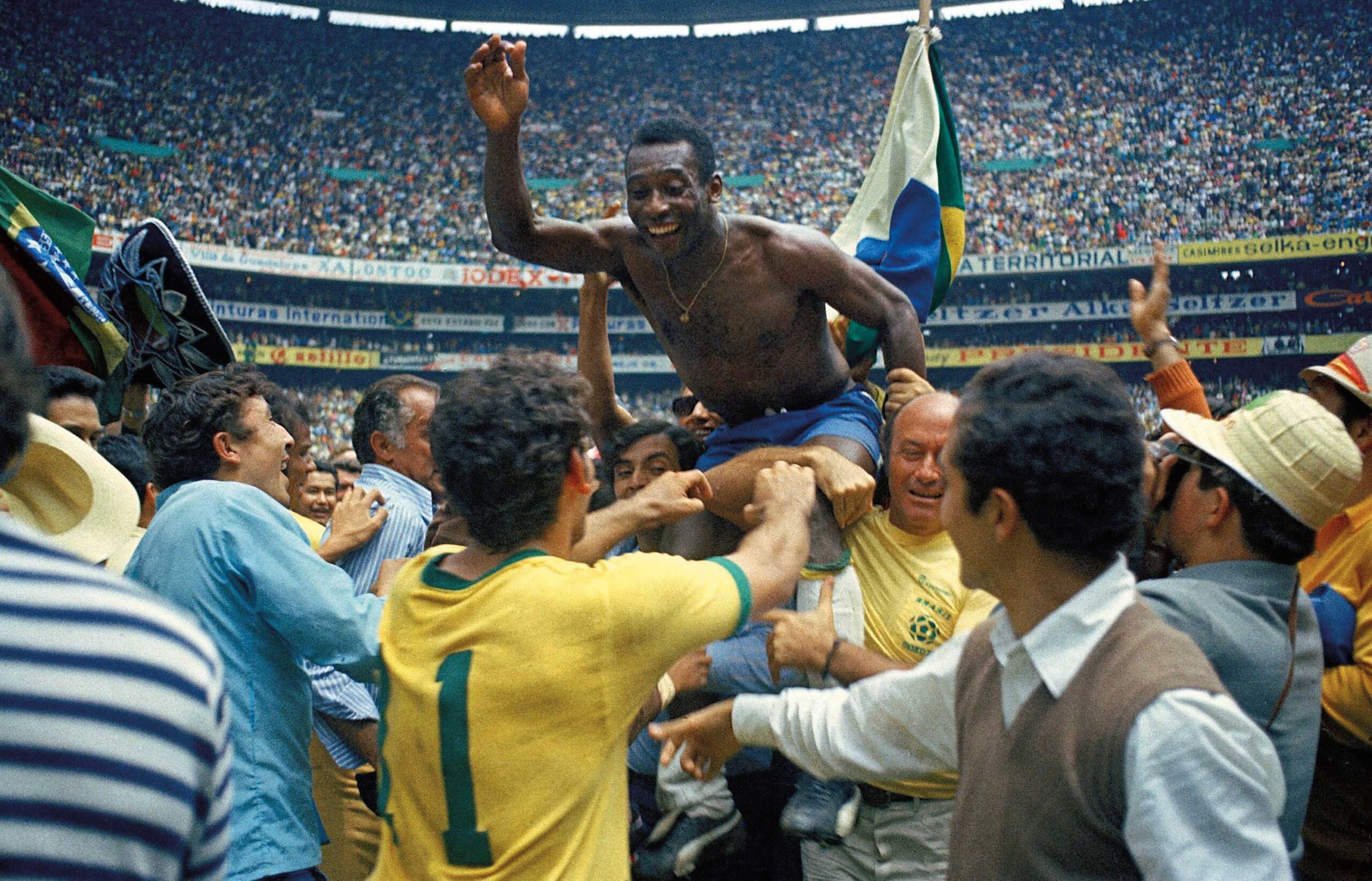

It's the circle of lifeDeath, taxes and Brazil winning the 1970 World Cup.
Always find it funny that no matter what TL we have either good or bad, Brazil always win 1970. Anything other than them winning it is ASB.
Well, there's one in which thanks to the way the qualifiers are set up, they don't even qualify in 1970.
In any case, there's a couple of PODs that might butterfly that:
-A little less luck against England.
-Saldanha managing the team into the World Cup - OTL, there was some political pressure to remove him, because he opposed the military regime and was associated with communists, but they couldn't really touch him until the results started drying up, which just happened to be four months before the tournament.
-Related to that, upon Zagallo's hiring, the positions on the team's staff were quickly filled up by military men - not only that gave some needed discipline and organization to the way things were run, something that had been decidedly lacking in 1966, and also had effects on the physical training, also in contrast with 1966, where the physical trainer was a judo trainer that just happened to be related by marriage to one of the delegation heads, and whose methods turned out to be utterly inadequate for football. One might make the argument that with a different political situation (say, the coup of 1964 is averted or the coup-within-the-coup that took place when Costa e Silva had a stroke in 1969 doesn't happen), all that might not happen.
-Pelé not changing his mind about retiring from World Cups after 1966.
Last edited:
The funny thing is that I was considering a possibility of Brazil not winning the cup, but I just feel like that '70 team deserves the trophy. Maybe in a different timeline that is a bit more political, but not now.-A little less luck against England.
-Saldanha managing the team into the World Cup - OTL, there was some political pressure to remove him, because he opposed the military regime and was associated with communists, but they couldn't really touch him until the results started drying up, which just happened to be four months before the tournament.
-Related to that, upon Zagallo's hiring, the positions on the team's staff were quickly filled up by military men - not only that gave some needed discipline and organization to the way things were run, something that had been decidedly lacking in 1966, and also had effects on the physical training, also in contrast with 1966, where the physical trainer was a judo trainer that just happened to be related by marriage to one of the delegation heads, and whose methods turned out to be utterly inadequate for football. One might make the argument that with a different political situation (say, the coup of 1964 is averted or the coup-within-the-coup that took place when Costa e Silva had a stroke in 1969 doesn't happen), all that might not happen.
-Pelé not changing his mind about retiring from World Cups after 1966.
1972 Euro: Group Stage
New
1972 European Championship
"The bomber strikes again"

With Yugoslavia becoming the European champions of 1968, Henri Delaunay's competition had thus far seen three Eastern-European countries winning the cup, with the only exception being Austria's Wunderteam all the way back in 1932. Certainly, the tournament had grown a lot since those baby steps of 1932, and now it was about to reach its 40th anniversary! As such, there was a push by the French members within UEFA to bring the European Championship back to the place of its origin. However, Belgium was chosen instead. The small Benelux country was seemingly entering a bit of a golden age in footballing terms, having qualified for the 1970 World Cup, and it didn't help that by the time the host was being chosen for the event, France was in the middle of an economic crisis, especially following the "May 68" events."The bomber strikes again"

The 1972 edition would see the return of the Hungarians, following their odd dissapearance back in 1968. The Magyars were expected to make a good showcase as always, having outqualified France and Bulgaria in their group, although the latter were recovering after the unfortunate death of their starman Georgi Asparuhov. Romania was making its debut in the European stage, but perhaps the most notable absence in the tournament was Scotland! For the first time since its entry in the 1950 World Cup, Scotland had failed to qualify for a major Football tournament, having suffered a disastrous loss to Denmark in its group that endedn up costing them the entry in the competition. Along with Romania, Belgium was making its debut via the hosting honors, and hopes were high that the Red Devils could make a splash.
As it had been the case in 1968, four venues were chosen for the tournament, two for each group. Most notably, the Heysel stadium was expanded to feature an athletic track, along with a floodlight system in order to hold the games at evenings. Having already seen finals of the European Cup Winners' Cup and Champions' Cup four times, the Heysel would now expand its stature as one of the great European stadiums with the hosting of the Euro finals. Anotherchange occured within the European Championship. Unlike in the previous iteration, which had the group winners face off in a final, the knockout stage would see a proper return this year with the first two teams facing off in the semi-finals.
Group 1
In the opening match, held on a packed Heysel stadium, Belgium played against fellow debutants Romania in what was a Paul van Himst masterclass. A header in the 20th minute and a penalty in the 85th, Belgium's 2-1 victory against the Tricolors marked a perfect start to the tournament for the hosts, aided by a scoreless draw between Germany and Italy. While Germany was busy beating Romania 2-0 thanks to Overath and Muller, Belgiums dream start only got better. Italy, who were seen as the favourites prior to the match, were in for a shock when Wilfried van Moer stunned the runnners-up in the the 23rd minute. From then on, the Azzurri played catch up, which only got worse when in the 71st minute, van Himst made it 2-0 for Belgium, sending the Anderlecht stadium into ecstacy! Gigi Riva was only able to score a consulation goal in the dying minutes of the game, and that marked the end. Belgium had won against Italy, and the Red Devils had their ticket for the semis.
Come the final day of the group stage, Italy needed to win against Romania and for Belgium to win against Germany in order to advance. Pierino Prati's two goals in a span of a minute made it an immediate 2-0 for Italy before the first half was even over, with Flavius Domide slimming down the scoring in the second half. However, Franco Causio made it into 3-1 for Italy, with Iuliu Hajnal only scoring a consulation goal in the last minute to make the scoring slightly more acceptable. Italy had won, but Gerd Muller turned once more into a hero of the Mannschaft, scoring two crucial goals in order to send Germany into the semis, followed only by the hosts. Italy's implosion against Belgium had costed this generation of the Azzurri dearly, and that "Game of the century" from two years ago looked very distant.
Jean Dockx fighting his way past Franco Causio


Group 2
The "Group of death" was as political as it could get. Hungary, Yugoslavia and the Soviet Union - all of these countries had some history behind them in the recent years, with the Hungarians especially seeing their encounter with the Soviets as a Must-win endeavour. The reigning European champions, Yugoslavia, also had some history with England, having won that famous "Battle of Florence" back in 1968 under controversial circumstances. Yugoslavia's campaign though was a shambles, as was Hungarys. The two teams pulled off a draw in which neither played all that well. Vujadin Boškov's Blues in particular looked like no matter the result, they were constantly defending, while Hungary's clumsy defense led them being beaten by the Soviets 1-0, only for England to make things more miserable for them thanks to Geoff Hurst, Franny Lee and Martin Chivers.
Having tied twice, Yugoslavia now needed a win against the Soviet Union in order to go through. The Reds had lost to England thanks to a squeaky 2-1 loss in which an own goal decided the affair, but Yugoslavias' ineffective attack meant that many questions were brought up if the viewers were going to see a highly defensive match. Well, they didn't. While the first half saw a draw, the Soviets broke through the Yugoslav defense in the 53rd minute, as Viktor Kolotov made it 1-0 for the Soviets. Not even 20 minutes later, Anatoliy Banishevsky made it 2-0, and then Eduard Kozinkevich finally sealed the deal in the 90th minute to make it a 3-0 victory for the Soviet Union. England was on top with an unbeaten streak, while the Soviet Union was entering its fourth consecutive appearance in the knockout stage of the Euros.
England's players before their match with the USSR
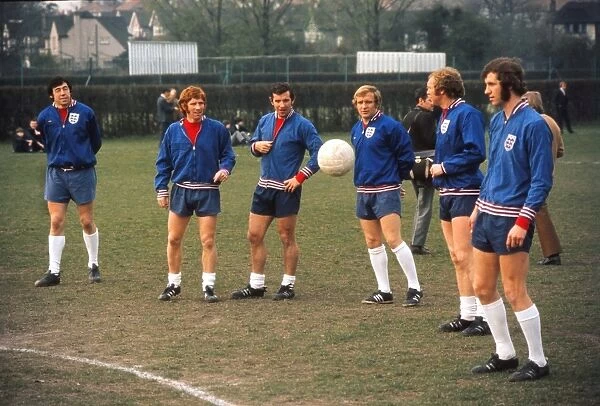

The following matches for the semi-finals:
Germany v Soviet Union
England v Belgium
Share: